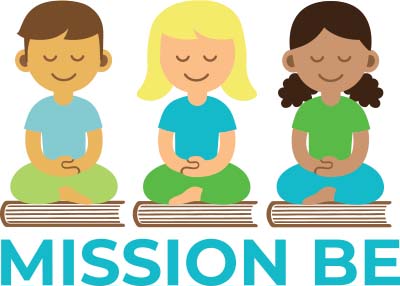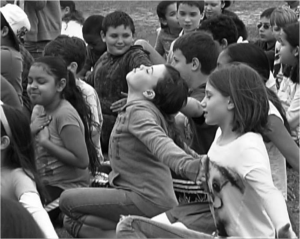
Children are stressed and mindfulness can help
School children are able to fulfill their academic and life potential through training in social and emotional skills. Many children report chronic academic and social pressures at school and home. A survey conducted by the American Psychological Association in 2009, for example, found that 45% of US teens were stressed by school pressures. Chronic stress in children can in turn undermine learning; chronic exposure to stress increases wear and tear on areas of the brain associated with executive control (ability to martial attention, use working memory and exercise inhibition), language and other cognitive and behavioral functions.
Mission Be offers a solution to academic and social pressure and gives children the tools to self-regulate and empowers them to express themselves through the use of their voice, music and creative arts rooted in mindfulness and social and emotional learning based practices. Mission Be’s curriculum includes: student practices, workshops, projects, movement and cooperative games. We also train teachers, social workers, school administrators and parents the skills to be present and connect with one another and the children in meaningful, moving and creative ways.
Mindfulness practices help children self-regulate and thrive
Mission Be offers mindfulness based educational programs to train students to better manage stress and regulate emotions. Mindfulness can be described as the practice of paying attention in the present moment, and doing it intentionally and with non-judgment. Mindfulness has emerged as a powerful intervention skill for self-regulation noted in 2000+ studies (growing exponentially each year) showing its benefits. Expected immediate outcomes based on this research for our Mindfulness Programs include: 1) Reduced stress and improved physical well-being. 2) Improved ability to express one’s self both verbally and in the creative arts. 3) And increased ability to manage stress and stress-based short-term and long-term negative health outcomes, leading to a healthier adulthood. 4) Increased Focus: as seen in improved ability to pay attention and concentrate, to improve focus both academically, emotionally and creatively. 5) Improved Emotion Regulation: as seen in reduced impulsiveness rowdiness, suspensions and expulsions. 6) Increased Emotional Intelligence such as improved conflict resolution skills, 8) Increased empathy and respect: as seen in increased empathy and understanding of others and a decrease in judgement and an increase in inclusion in the school community. 7) Increased resilience and self-confidence: such as increased capacity to overcome challenges.
We believe that equipping children with key mindfulness-based social emotional skills will not only help them perform better academically and in their careers, but will also help them become more creative, inventive, compassionate, empathetic, caring members of society. Children growing up with skills to regulate their emotions and express themselves, tend to better understand their own needs, to recognize other’s needs, to value nature and to problem solve compassionately will help usher in a more peaceful, healthy, happy and thriving future.

Mission Be helps children and communities become self-regulated, happier and more peaceful.
Mission Be helps children regulate emotions. We bring mindfulness-based social emotional learning programs to schools as an antidote to stress, violence, bullying and addiction and thereby increase the number of thriving, happy and peaceful children in the world. Mission Be’s programs are: 1) 4 to 32 Weeks In-Class Mindfulness Program for K-12 students 2) 18 hour weekend Mindful Educator Trainings for teachers and educators 3) Online Courses for 6 weeks, 90 minutes a week 4) Faculty Meetings and Professional Development for Teachers, Support Staff and Administration 5) Mindful Music and Concious Hip Hop and Art Program, 8 week course of song writing, music development and the arts. 6) Parent Workshops
Our school programs aim to improve children’s academic and life success by building their skills of stress-management, inner-resilience, emotion regulation, and executive control, and overall physical and emotional well-being. Our curriculum helps children cultivate empathy and compassion towards themselves and others thereby helping to create safer and more nurturing school climates. Our trainings for teachers helps build teachers’ own resilience and capacity to thrive in the classroom while providing them with a curriculum to bring mindfulness practices to their students.
Since launching in 2013 in New York, we have successfully implemented our mindful education curriculum in 150+ schools reaching 168,000+ students in New York and California. We have also trained thousands of educators in New York and California.
What is Mindfulness?
Mindfulness can be described as the practice of paying attention in the present moment, and doing it intentionally and with non-judgment. Mindfulness meditation practices refer to the deliberate acts of regulating attention through the observation of thoughts, emotions and body states. Typical mindfulness activities include:
- Mindful non-judgmental awareness of breath, body, feelings, emotions and/or thoughts (in sitting meditation practice or throughout the day)
- Mindful walking meditation
- Mindful eating
- Mindful body scan in a sitting or lying down position
- Listening with non-judgment
What can mindfulness do for students?
- Reduced Stress: Improved ability to manage stress
- Increased Focus: Improved ability to pay attention, focus and concentrate
- Improved Emotion Regulation: Reduced impulsiveness, improved child behavior (rowdiness, suspensions, expulsions)
- Increased Emotional Intelligence: Improved conflict resolution skills
- Increased Empathy and Respect: Increased empathy and understanding of others
- Increased Resilience: Increased capacity to overcome challenges
- Improved Physical Well-being: Increased engagement in physical activity
- Improved Creativity & Collaboration: Improved expression of creative arts.
Students will find it much easier to focus and actively engage in the classroom. The class will benefit as a whole from a collective calm. These skills can also be applied to maturely navigate challenging peer or family interactions. Students will be less likely to bully others, and those students who are bullied will be more resilient. Students are also less likely to engage in high-risk behaviors as they will be calmer and less reactive. Some immediate benefits we expect to see are:
What can mindfulness do for teachers?
- Reduced stress and burnout (and reduced absenteeism from stress and burnout related conditions)
- More easily managed classrooms
- Improved learning conditions
- Positive dyadic teacher-student relationships
Teachers will be able to spend more time teaching and less time managing the classroom and also be better equipped to handle the stresses of work. Teachers teaching students that are practicing mindfulness will also find students to be better mentally equipped to learn.
Is mindfulness religious?
No. Mindfulness is a practice – the practice of paying attention in the present moment and doing it with non-judgment. Over the last 30 years this practice has been thoroughly researched and successfully implemented in hospitals, businesses, education and the military.
Our programs are differentiated by our commitment to four core values
Transformative social-emotional learning based in mindfulness
Providing the highest quality of sustainable and universally-accessible mindfulness programming
Continual personal and professional learning, growth and development for team members
Embodying mindfulness, open-communication, joy and compassion within the organization

